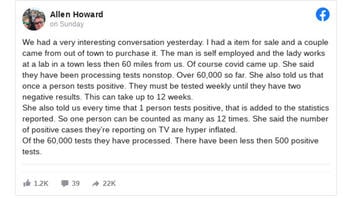
Can a person with coronavirus be counted as more than one case, if he or she takes multiple tests and the results of those tests keep coming back positive? No, that's not true: Case counts and testing counts are separate. A person can have multiple tests in their file but they are still counted as only one case of coronavirus.
The claim appeared in a Facebook post (archived here) on June 28, 2020. It opened:
We had a very interesting conversation yesterday. I had a item for sale and a couple came from out of town to purchase it. The man is self employed and the lady works at a lab ... She said they have been processing tests nonstop. Over 60,000 so far. She also told us that once a person tests positive. They must be tested weekly until they have two negative results. This can take up to 12 weeks. She also told us every time that 1 person tests positive, that is added to the statistics reported. So one person can be counted as many as 12 times.
This is what the post looked like:
(Source: Facebook screenshot taken on Thu Jul 2 14:19:55 2020 UTC)
The post continued:
She said the number of positive cases they're reporting on TV are hyper inflated. Of the 60,000 tests they have processed. There have been less then 500 positive tests.
It had been shared more than 22,000 times at the time of writing.
The post is inaccurate because it conflates two separate things: case counts and testing counts. Testing counts represent the number of tests administered, while case counts represent the number of people confirmed with coronavirus. The United States has more than 2.6 million confirmed cases and some 35.3 million reported tests (of which more than 3.3 million were positive), according to the Centers for Disease Control and Prevention (CDC).
Besides the CDC, one of the principal organizations tracking global coronavirus cases is Johns Hopkins University. CNN, for example, uses figures from there to populate its map tracking Covid-19 cases in the US.
Lead Stories spoke to Panagis Galiatsatos, an assistant professor at the Johns Hopkins University School of Medicine and a pulmonary and critical care doctor, about the possibility of double counting. He dismissed it, saying:
If you go test yourself a thousand times, you're only going to get reported as one human being, not a thousand tests.
Galiatsatos also dismissed the claim that the number of positive cases is inflated. If anything, he said, the reported numbers are an underestimation. Not everyone with the virus is tested, especially those who don't experience any symptoms but are still carriers. Galiatsatos told Lead Stories:
We all believe that we are underestimating the gravity of the situation overall. Our numbers may look bad, but they're probably much worse if we could test more people.


















